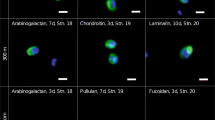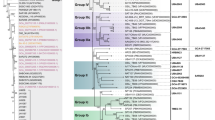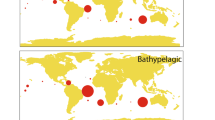Abstract
BACTERIA which are isolated from marine environments and require for growth a medium containing sea water are classified as true marine organisms. Recent evidence1 indicates that the inability of marine bacteria to grow in the absence of sea water is due to a requirement for specific inorganic ions. A second, but not as well-defined, characteristic of marine bacteria is their high proteolytic activity and their rapid growth on organic nitrogen compounds2.
This is a preview of subscription content, access via your institution
Access options
Subscribe to this journal
Receive 51 print issues and online access
$199.00 per year
only $3.90 per issue
Buy this article
- Purchase on Springer Link
- Instant access to full article PDF
Prices may be subject to local taxes which are calculated during checkout
Similar content being viewed by others
References
MacLeod, R. A., and Onofrey, E., J. Bacteriol., 71, 661 (1956).
ZoBell, C. E., “Marine Microbiology” (Chronica Botanica Co., Waltham, Mass., 1946).
Umbreit, W. W., Burris, R. H., and Stauffer, J. F., “Manometric Techniques and Related Methods for the Study of Tissue Metabolism” (Burgess Publishing Co., Minneapolis, Minn., 1949).
Tomlinson, M., and MacLeod, R. A., Can. J. Microbiol., 3, 627 (1957).
Author information
Authors and Affiliations
Rights and permissions
About this article
Cite this article
MERKEL, J., CARLUCCI, A. & PRAMER, D. Respiratory Characteristics of Marine Bacteria. Nature 180, 1489–1490 (1957). https://doi.org/10.1038/1801489b0
Issue Date:
DOI: https://doi.org/10.1038/1801489b0
Comments
By submitting a comment you agree to abide by our Terms and Community Guidelines. If you find something abusive or that does not comply with our terms or guidelines please flag it as inappropriate.



